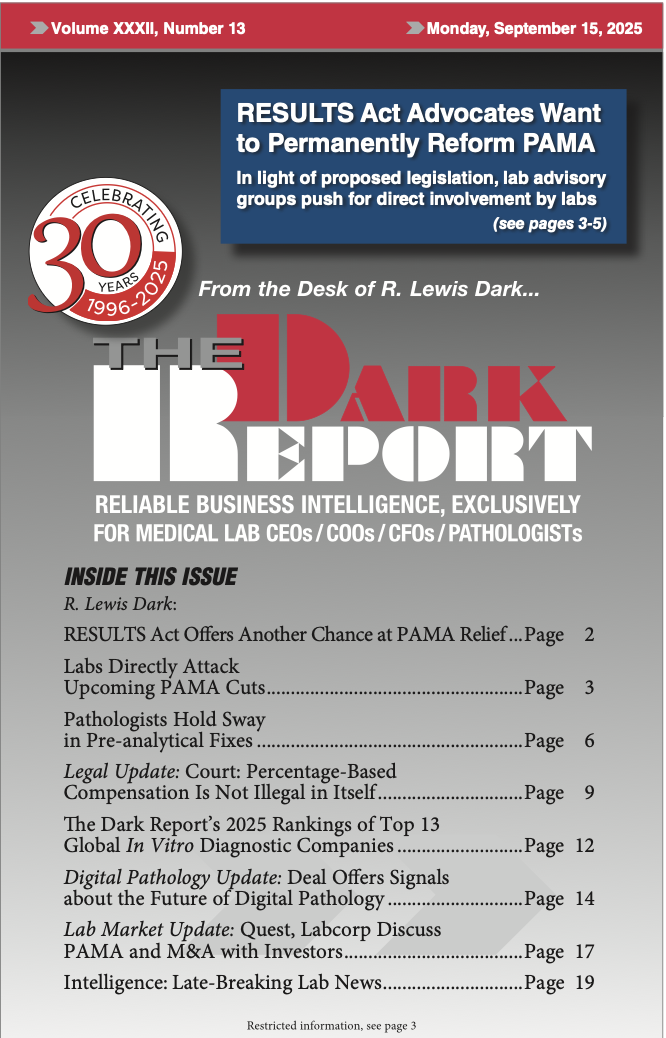Robert Michel
 Until Robert L. Michel came along and founded The Dark Intelligence Group (DIG) two decades ago, the clinical laboratory industry and the anatomic pathology profession lacked a trustworthy source for information about the management and operations of medical laboratories. From its inception in 1995, The Dark Report quickly became the “go to” source of industry intelligence, innovations in lab management, and strategic market analysis.
Until Robert L. Michel came along and founded The Dark Intelligence Group (DIG) two decades ago, the clinical laboratory industry and the anatomic pathology profession lacked a trustworthy source for information about the management and operations of medical laboratories. From its inception in 1995, The Dark Report quickly became the “go to” source of industry intelligence, innovations in lab management, and strategic market analysis.
This excellence in reporting has earned recognition from his peers. For example, twice Michel and The Dark Report have won national awards for best investigative reporting by the Specialty Information Publishers Association. In 2005, the award was for Michel’s coverage about how the anatomic pathology condominium laboratories (pod labs) operated by urologists and gastroenterologists came to be, who operated them, and how these owners marketed the AP condo labs to other physician groups. In 2009, Michel’s award for best investigative reporting resulted from his published interviews with Quest Diagnostics Incorporated when the company admitted that, for a period of 18 months, it had been reported inaccurate Vitamin 25(OH) D results because of problems with its laboratory-developed test methodology. The Dark Report’s story was picked up by The New York Times and was in the national news cycle for several days.
In his role as Editor-in-Chief, Michel brought unique capabilities to DIG and The Dark Report. His management training and diverse business experience—along with his skills as a concise writer and analyst—proved to be a winning combination for readers of The Dark Report. For that reason, Michel’s story has many intriguing elements.
Immediately prior to founding DIG, he had served in several executive positions for Nichols Institute based in Portland, Oregon, and San Juan Capistrano, California. This was during the time that Nichols Institute was an independent public lab company with annual revenues of about $280 million (prior to its acquisition by MetPath, Inc., now Quest Diagnostics Incorporated). He traveled extensively to many of the clinical lab business units owned by Nichols Institute in different regions of the United States and played a role in formulating effective market strategies in response to the emergence of closed-panel HMOs, capitated pricing, and full-risk managed care contracts, among other successful management initiatives.
Prior to his service at Nichols Institute, Michel served at three different Fortune 100 companies. These were Procter & Gamble, Centex Corporation, and Financial Corp. of America. Each was an opportunity to master new management techniques and apply them in different industries. Between these positions, he gained experience as an entrepreneur, having founded a real estate development firm and a general contracting company in the Southeastern United States.
Robert Michel earned a Bachelor of Arts degree in Economics at the University of California, Los Angeles, where he played rugby, a sport he participated in for another 22 years. He is a native of California and grew up in Santa Ana.
Articles by Robert Michel
FDA Advisory Panel Convenes To Assess Whole Slide Imaging
From the Volume XVI No. 15 – November 02, 2009 Issue
Editor’s Note: Guest writer Martin Perry attended the FDA’s advisory panel on digital pathology conducted earlier this month. He is CEO of The Perry Group and has extensive experience in imaging and healthcare. He offers his insights from the FDA proceedings on digital pathology imaging….
Health Info Exchange (HIE) Helps South Bend Lab
From the Volume XVI No. 15 – November 02, 2009 Issue
CEO SUMMARY: Across the country, there are many efforts to create Regional Health Information Exchanges (HIEs). This has the potential to change the way laboratories connect electronically with referring physicians. This is true in South Bend, Indiana, where the Michiana Health I…
New Privacy Breach Law Requires Labs to Respond
From the Volume XVI No. 15 – November 02, 2009 Issue
CEO SUMMARY: There were plenty of headlines about the passage of HITECH last February because of how it expanded funding for electronic medical records. But lesser known are new requirements that providers, including labs and pathology groups, must now take specific compliance ac…
Physicians in Survey Recognize Lack of Genetic Test Knowledge
From the Volume XVI No. 15 – November 02, 2009 Issue
MOST PHYSICIANS BELIEVE they are inadequately informed about pharmacogenomics (PGx) and how to utilize genetic tests. That’s the finding of a survey of 10,303 physicians and reveals an opportunity for pathologists and clinical lab professionals to fill an unmet need. In fact, only 10% of the 10,30…
DC Area Labs Busy Hiring Subspecialist Pathologists
From the Volume XVI No. 15 – November 02, 2009 Issue
CEO SUMMARY: When a mass exodus of at least 15 civilian subspecialist pathologists left the Armed Forces Institute of Pathology (AFIP) to join the newly-formed American International Pathology Laboratories (AIPL) in September, it triggered a number of consequences for both labs, …
November 02, 2009 “Intelligence: Late Breaking Lab News”
From the Volume XVI No. 15 – November 02, 2009 Issue
Digital microfluidics and lab-on-a-chip technologies are being combined to create a new way to measure breast estrogen levels in women. An interdisciplinary group at the University of Toronto developed a lab-on-a-chip technique to analyze blood and breast tissue to identify women at …
Expert Says Time is Now For Labs to Adopt QMS
From the Volume XVI No. 14 – October 12, 2009 Issue
CEO SUMMARY: Laboratories in the United States are knowledgeable about the use of quality control (QC) and quality assurance (QA) programs. But QC and QA represent only two small parts of a comprehensive quality management system (QMS), says Lucia Berte, an expert in lab quality. One bene…
Scripps’ Tumor Board Finds Value in Digital Imaging of Slides
From the Volume XVI No. 14 – October 12, 2009 Issue
CEO Summary: When the Pathology Department at Scripps Memorial Hospital in La Jolla, California, was considering the purchase of a digital imaging system, it gained unlikely allies. Non-pathologist physicians participating in the department’s tumor boards advocated for the purchase afte…
Bureaucratic System in Ireland Affects Access to Pap Testing
From the Volume XVI No. 14 – October 12, 2009 Issue
WHEN IT COMES TO CERVICAL CANCER SCREENING IN IRELAND, health system bureaucrats have put some of the nation’s women into the perfect “Catch 22.” As this happens, it provides another case study of why a government health system can often create coverage rules and restrictions which run contrar…
GSK and Abbott Team up For Companion Diagnostic
From the Volume XVI No. 14 – October 12, 2009 Issue
CEO SUMMARY: Although GlaxoSmithKline PLC is several years away from having a deliverable product from its Antigen Specific Cancer Immunoassay (ASCI) Program, it has a development deal with Abbott Laboratories to produce a companion diagnostic test for ASCI-based products. The in…
CURRENT ISSUE

Volume XXXII, No. 13 – September 15, 2025
The Dark Report examines a new bill that would reform PAMA and avoid reimbursement rate cuts scheduled for January 2026. Clinical laboratory leaders are urged to make their voices heard in Congress. Also, an expert describes how labs can fix pre-analytical errors and avoid disaster.
See the full table of contentsHow Much Laboratory Business Intelligence Have You Missed?
Lab leaders rely on THE DARK REPORT for actionable intelligence on important developments in the business of laboratory testing. Maximize the money you make-and the money you keep! Best of all, it is released every three weeks!
Sign up for TDR Insider
Join the Dark Intelligence Group FREE and get TDR Insider FREE!
Never miss a single update on the issues that matter to you and your business.
Topics
- Anatomic Pathology
- Clinical Chemistry
- Clinical Laboratory
- Clinical Laboratory Trends
- Digital Pathology
- Genetic Testing
- In Vitro Diagnostics
- IVD/Lab Informatics
- Lab Intelligence
- Lab Marketplace
- Lab Risk & Compliance
- Laboratory Automation
- Laboratory Billing
- Laboratory Compliance
- Laboratory Equipment
- Laboratory Information Systems
- Laboratory Management
- Lean Six Sigma
- Managed Care Contracts
- Molecular Diagnostics
- Pathology Trends
- People
- Uncategorized

